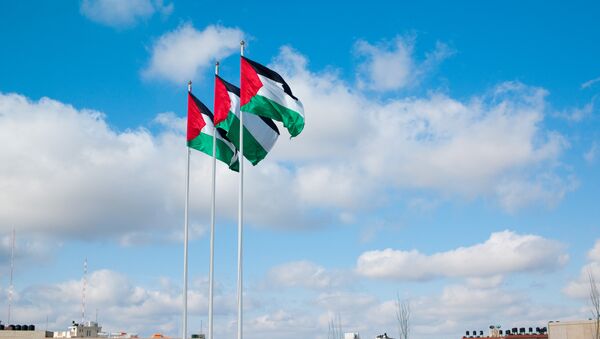MOSCOW, November 15 (Sputnik) — Twenty-six years ago, on November 15, 1988, Palestinians declared independence of the State of Palestine, which claims the territories of the West Bank and the Gaza Strip, with Jerusalem as a designated capital. A partial control of those territories was assumed in 2004, after the self-government body, the Palestinian Authority (PA) was established.
The PA, formerly known as the Palestinian National Authority (PNA), was formed as a consequence of the Oslo Accords between the Palestine Liberation Organization (PLO) and the government of Israel.
The Oslo Accords included the "Declaration of Principles on Interim Self-Government Arrangements" (Oslo I Accord), signed in 1993, the Gaza-Jericho Agreement (Cairo Agreement), signed in 1994, and the Interim Agreement on the West Bank and the Gaza Strip (Oslo II Accord), singed in 1995.
The Accords stipulated giving the PA governance over some parts of the West Bank and the Gaza Strip, occupied by Israel since the Arab-Israeli war of 1967. Israel was said to maintain control over external borders with Egypt and Jordan, as well as the Gaza coastal waters.
The total area of the Palestinian State is over 2,340 square miles, with 2,200 square miles in the West Bank and 140 square miles in Gaza. The population is about 4 million people (2.5 million in the West Bank, 1.5 million in Gaza). West Bank residents also include Israeli citizens, or the so-called Jewish settlers, who live there in violation of international regulations.
About 6.5 million Palestinians live in other countries, with many of them having an official refugee or displaced person status.
The majority of people living in the PA are Muslim (75 percent in the West Bank, 89.7 percent in Gaza). The official language is Arabic, although English is wide-spread and many Palestinians speak Hebrew. The PA has proclaimed East Jerusalem its capital, although it was annexed by Israel in 1980, prior to the formation of the PA.
Agriculture and tourism are some of the spheres that form the backbone of the PA economy. 62 percent of the PA population works in non-productive areas.
The PA divides its territories into governorates (11 in West Bank and 5 in Gaza). Governors are appointed by the PA head and are in charge of predominantly administrative issues, resolved in coordination with PA municipal and mayoral authorities.
The president of the PA, who is also the commander-in-chief of the armed forces, is directly elected by the people. Yasser Arafat was the first president of the PA. The current president, Mahmoud Abbas, was elected in January 2005.
The legislative branch of the PA is the Palestinian Legislative Council (PLC). 74 of the 132 PLC seats were won by representatives of the Hamas Islamic organization in the January 25, 2006 parliamentary elections. The PLO-affiliated Fatah party was thus defeated. PLC's activity is now paralyzed since a significant number of its members, mostly Hamas supporters, have been arrested and imprisoned by Israel on political grounds.
In March 2007, a national unity government headed by PA Prime Minister Ismail Haniyeh of Hamas was briefly formed, but tensions between Fatah and Hamas over control of Palestinian security forces soon erupted leading to the 2007 Battle of Gaza after which Hamas took control of Gaza, while its officials were ousted from government positions in the West Bank.
In 2011, Hamas and Fatah announced a reconciliation agreement that provides for the creation of a joint caretaker Palestinian government. Progress stalled, until a new Palestinian unity government was sworn in on June 2, 2014.
On November 29, 2013 the UN General Assembly raised the status of the PA in the organization to "observer state" and reaffirmed the right of Palestinians to self-determination within the territories occupied by Israel in 1967.
On January 5, 2014, Abbas signed a decree renaming the PS into the State of Palestine.
Over 100 countries have recognized Palestine as a sovereign state. The European Union and most of EU member-states have not officially recognized Palestine's sovereignty.


